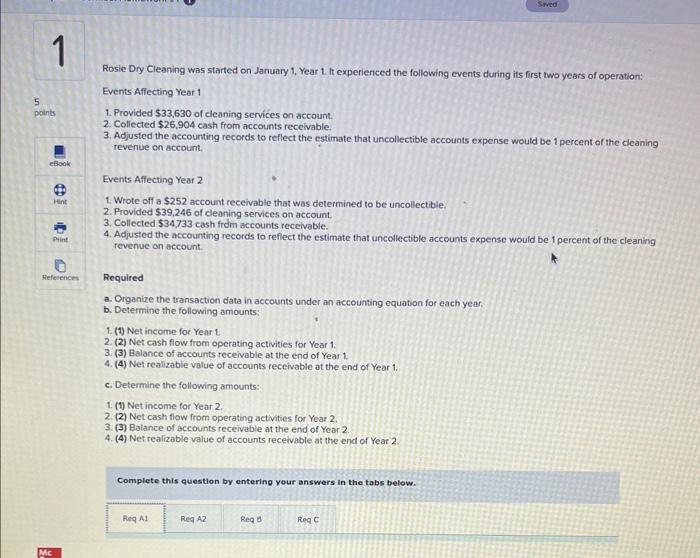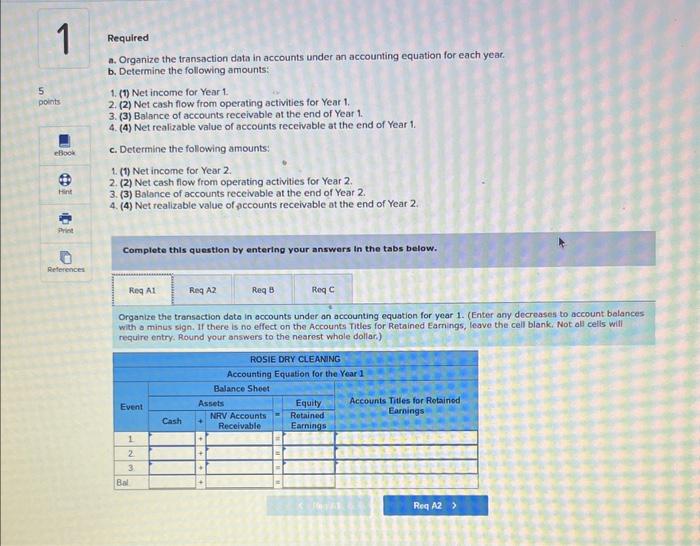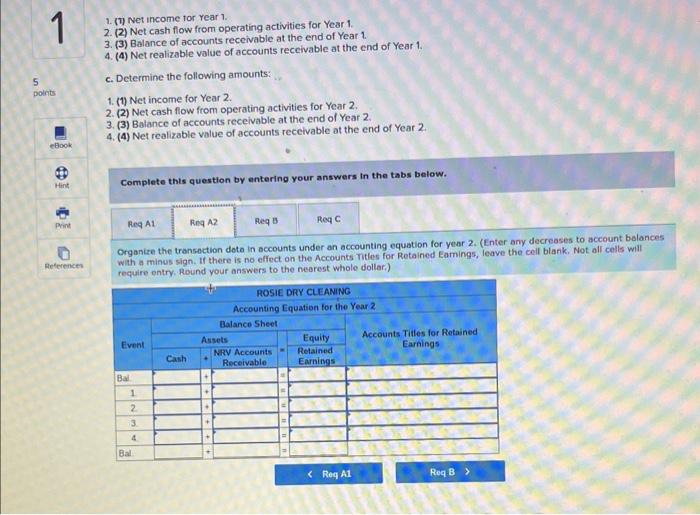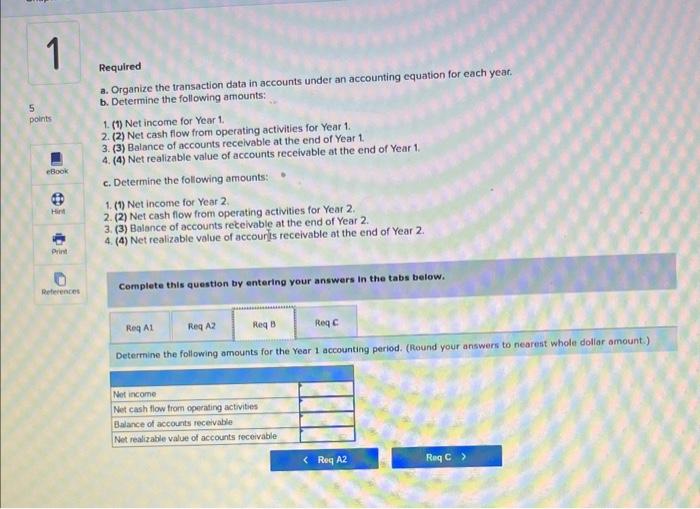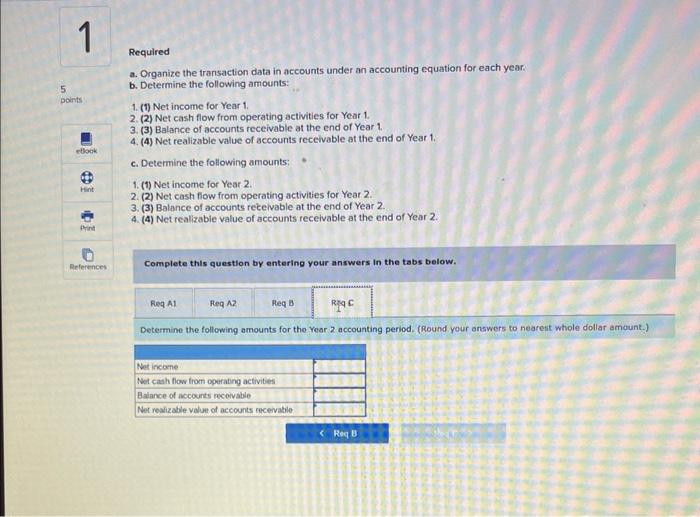Rosie Dry Cleaning was started on January 1, Year t. It experienced the following events during its first two years of operation: Events Affecting Year 1 1. Provided $33,630 of cleaning services on account. 2. Collected $26,904 cash from accounts receivable. 3. Adjusted the accounting records to reflect the estimate that uncollectible accounts expense would be 1 percent of the cleaning revenue on account. Events Affecting Year 2 1. Wrote off a $252 account receivable that was determined to be uncollectible. 2. Provided $39,246 of cleaning services on account. 3. Collected $34,733 cash from accounts receivable. 4. Adjusted the accounting records to reflect the estimate that uncollectible accounts expense would be 1 percent of the cleaning revenue on account. Required a. Organize the transaction data in accounts under an accounting equation for each year. b. Determine the following amounts: 1. (1) Net income for Year L. 2. (2) Net cash flow from operating activities for Year 1. 3. (3) Balance of accounts receivable at the end of Year 1 . 4. (4) Net realizable value of accounts receivable at the end of Year 1. c. Determine the following amounts: 1. (1) Net income for Year 2 . 2. (2) Net cash flow from operating activities for Year 2. 3. (3) Balance of accounts receivable at the end of Year 2. 4. (4) Net realizable value of accounts receivable at the end of Year 2. Complete this question by entering your answers in the tabs below. Required a. Organize the transaction data in accounts under an accounting equation for each yeat. b. Determine the following amounts: 1. (1) Net income for Year 1 . 2. (2) Net cash flow from operating activities for Year 1 . 3. (3) Balance of accounts receivable at the end of Year 1. 4. (4) Net realizable value of accounts recelvable at the end of Year 1. c. Determine the following amounts: 1. (1) Net income for Year 2 . 2. (2) Net cash flow from operating activities for Year 2. 3. (3) Balance of accounts receivable at the end of Year 2. 4. (4) Net realizable value of pccounts receivable at the end of Year 2 . Complete this question by entering your answers in the tabs below. Organize the transaction dote in accounts under an accounting equation for year 1 . (Enter any decreases to account belances with a minus sign. If there is no effect on the Accounts ntles for Retained Earnings, leave the cell blank, Not all cells will. require entry. Round your answers to the nearest whole dollar.) 2. (2) Net cash fiow from Balance of accounts receivable at the end of Year 1. 3. (3) Balance of accounts rece realizable value of accounts receivable at the end of Year 1 . c. Determine the following amounts: 1. (1) Net income for Year 2. 2. (2) Net cash flow from operating activities for Year 2. 3. (3) Balance of accounts receivable at the end of Year 2. 4. (4) Net realizable value of accounts receivable ot the end of Year 2 . Complete this question by entering your answers in the tabs below. Organire the transection dote in accounts under an accounting equation for year 2. (Enter any decreases to account balances wath a minus sign. If there is no effect on the Accounts Titles for Retained Eamings, leave the cell blank. Not all cells will require entry. Round your answers to the nearest whole dollar.) Required a. Organize the transaction data in accounts under an accounting equation for each year. b. Determine the following amounts: 1. (1) Net income for Year 1 . 2. (2) Net cash flow from operating activities for Year 1. 3. (3) Balance of accounts recelvable at the end of Year 1 . 4. (4) Net realizable value of accounts receivable at the end of Year 1. c. Determine the following amounts: 1. (1) Net income for Year 2 . 2. (2) Net cash flow from operating activities for Year 2 . 3. (3) Balance of accounts recelvable at the end of Year 2. 4. (4) Net realizable value of accounis receivable at the end of Year 2 . Complete this question by entering your answers in the tabs below. Determine the following amounts for the Year 1 accounting period. (Round your answers to nearest whole dollar amount.) Required a. Organize the transaction data in accounts under an accounting equation for each year. b. Determine the following amounts: 1. (1) Net income for Year 1 . 2. (2) Net cash flow from operating acthities for Year 1 . 3. (3) Balance of accounts receivable at the end of Year 1. 4. (4) Net realizable value of accounts receivable at the end of Year 1 . c. Determine the following amounts: 1. (1) Net income for Year 2. 2. (2) Net cash flow from operating activities for Year 2. 3. (3) Balance of accounts recelvable at the end of Year 2. 4. (4) Net realizabie value of accounts receivable at the end of Year 2 . Complete this question by entering your answers In the tabs below. Determine the following amounts for the Year 2 accounting period. (Round your onswers to nearent whole dollar amount.)
